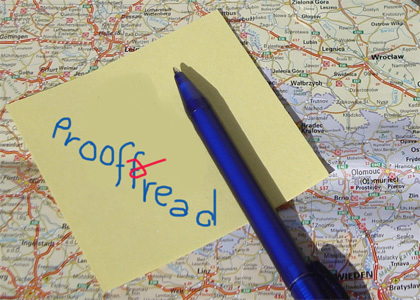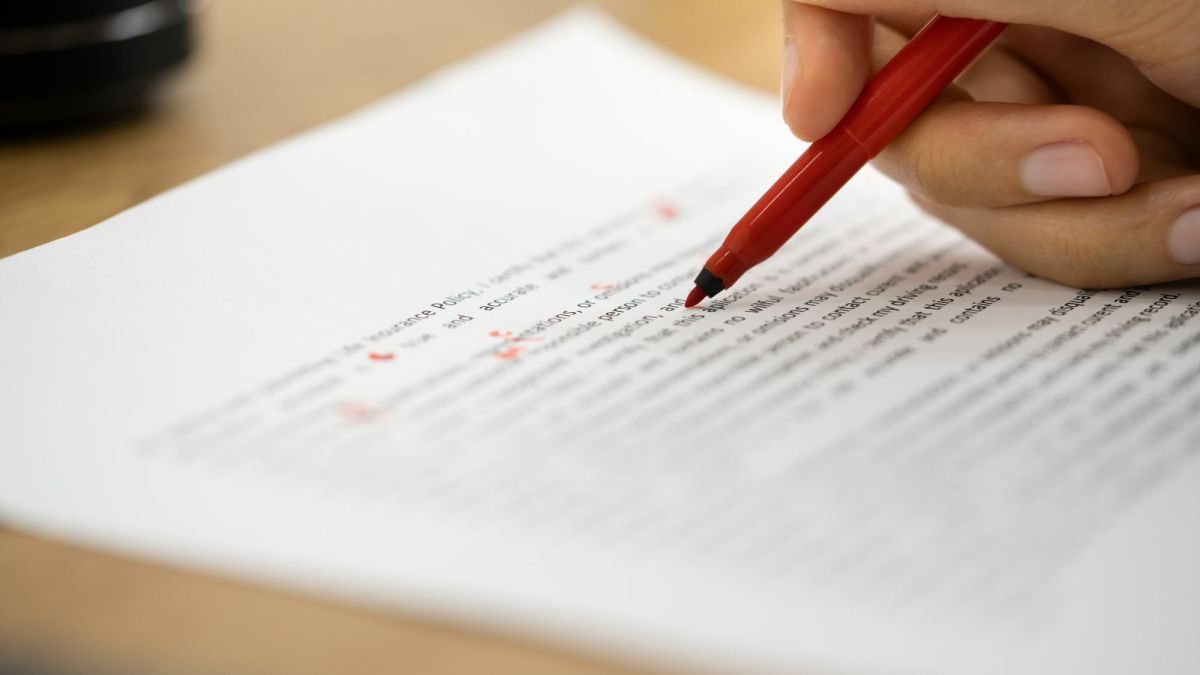Proofreading is Hard!

I'm not sure I can do it, actually!
For anyone who might be under the misapprehension that proofreading is about picking out a few typos and adding a few commas, it isn't. Well, it is, but that's only part of it.
I received my first assignment mark today, and what I learned about proofreading in those few minutes that it took to read my comments was that leaving well enough alone is just as important as pointing out mistakes. I was too picky! In my efforts to make sure that I did not miss a single mistake, I found too many. Now, you might be confused by this - I was at first, still am a little bit - because, surely, you can't find too many mistakes? Surely, if you notice a mistake you have to point it out? Well, yes, you do, that's absolutely right; but you have to point it out in the correct colour! I was pointing out mistakes in blue, when I should have been highlighting them in pencil. Ah.
It would seem that I have been developing this bad-mannered habit of thinking that I know better than the editor. I have been tempted into re-editing. That is not the job of the proofreader.
Let me show you how it plays out:
Author → writes book, sends it to Publisher in form of typescript, or electronic file
Publisher → has the book costed, copy-edited, designed
Typesetter → keys amendments to text, as suggested by copy-editor, then returns copy and proofs to Publisher
Publisher → sends proofs out to Author, Proofreader, Indexer, then all proofs are collated and combined into a single master set, and returned to the Typesetter for final amendment
Typesetter → makes changes, then when the Publisher gives final approval the book is sent for printing
Printer → prints the book, sends it for binding
Binder → binds the book, sends the stock to the Publisher's warehouse or distributor
Proofreader = one little piece in a great big making-a-book jigsaw.
So, if you spot a typesetter error it definitely has to be changed, and the typesetters bear the cost for the time that takes - those errors are marked in red. If you spot an editor error you have two choices. Is it a glaring mistake that must be changed because it will mislead the reader? Spelling mistakes missed by the copy-editor must be changed, of course, definitely, and the publishers rather than the typesetters pay for these - these errors are marked in blue. But it's missing commas that stymie me! To me that missing comma might be essential, because I'm a stickler for them. But inserting every missed comma can be too time-consuming, and can have the knock-on effect of causing the book to miss it's scheduled slot on the printing press. This can be costly. So here is the second choice: you can either use your judgement to decide that it's alright to leave the comma out, or you can query it - queries marked in pencil, saying, in so many words 'are you sure it's alright for this sentence to be comma-less?' The responsibility is already causing me to have palpitations.
But, this is why publishing houses only use proofreaders with a few years' worth of experience. I must learn to chill about proofreading. I must learn to accept that I may miss the odd grammatical error, because I am not an expert. No-one expects me to get 100% - yet!
So I paid full attention to the notes my tutor had written - mostly very positive and encouraging, but containing a warning to query more in pencil. I opened my notes to the second unit, and did this: 'ohhhhhhh, nohhhhhhhhhh, I've forgotten everything! Gibber, gibber, gibber...' I had a little bit of panic, but then calmed myself down, and got down to reading.
Reading the notes for each new topic of proofreading elicits two responses from me, the second following on fairly rapidly from the first: 1) 'You what?!' I do not understand what I am being told to look out for, and know that I will miss it every time; 2) realisation and relief: 'oh, I'm just looking for small dashes that should be large ones, I see.'
Then I complete an exercise to cement what I have just learned into my brain. The exercises are invaluable. You complete them, then mark them with the answer sheets. I'm very strict with myself, and mark as my tutor would, not letting myself off with anything; no point in cheating, because we learn nothing that way.
But even in the exercises I miss obvious errors, and then it's all over: I'm a useless proofreader, is there even any point in finishing the course, is there even any point in submitting the next assignment? SLAP! Well, of course there is, pull yourself together. You paid a lot to be trained by the best, you silly girl! You did not pay a lot just to be told that you already know everything! Just try harder!
Second assignment submitted. I am nervous that I will have corrected my mistakes from last time, and made whole new ones. Bah! What can I do? It's done, and I can only wait for the result. In the meantime I will press on with the exercises for the third unit. Gibber, gibber, gibber!
What do I know about proofreading though? For definite? I know this: you can't do it properly if you're tired, so get some sleep. I did a practice run of my second assignment when I was tired. When I looked at it the next day I was horrified to see that I had missed quite a few very obvious mistakes. To be expected.
So, if you are thinking of trying your hand at proofreading, bear in mind that you need plenty of sleep, calmness (camomile tea?) and a comfortable sitting position. Hopefully this will be the formula for perfect error spotting.
Onwards...








